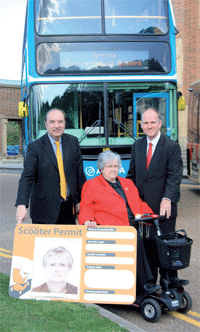
CPT launches Code of Practice for using permits to allow type 2 scooters onto low-floor buses
Transport minister Norman Baker and CPT president Steve Whiteway launched the CPT’s new Code of Practice for the use and acceptance of mobility scooters on low-floor buses last Wednesday (September 14th).
Developed after discussions with the Department for Transport (DfT), the code simplifies and puts in place standardised procedures for operators and scooter riders to ensure they are able to safely use bus services.
It works on a permit system for the mobility scooter user and aims to make it easier for the bus driver to recognise the mobility scooter has been approved by the operator and the user has been trained in how to safely board and alight from the bus.
The code, which applies to type 2 scooters only, has been developed with input from Arriva, FirstGroup, National Express, Stagecoach, and Thames down Transport who at the time of the launch, had accepted the code alongside Western Greyhound, Safeguard Coaches, East Yorkshire Motor Services and Epsom Coaches subsidiary, Quality Line.
The CPT said, in practice, the code adopts the approach many companies currently operate where they request scooter users to contact them, so they can assess the suitability of the scooter and user to travel on the buses. This normally entails an instructor or supervisor meeting the user with a low floor bus. The user will then be issued with a permit to avoid problems when using our services.
Margaret S N Gellaty, who joined the launch from Chelmsford, is the first permit holder of the CPT code.
The permit is not one to travel, but indicates the holder has been assessed and the combination of scooter and user can travel on local bus services which are operated by DDA compliant buses: these conditions are clearly stated on the reverse of the permit. Permits issued by any operator will be accepted.
The overriding objective is to remove confusion and ambiguity which exists over this issue at present, and minimise the potential for conflict between the driver and a customer, or negative PR.
“We are encouraging all operators to sign up to the code – it will take some time for users and drivers to become aware of the code, so we are looking for a degree of understanding on both sides,” said the CPT.
Formally launching the code outside Guildford Cathedral, Baker said: “This is a very good initiative. When I’ve looked at customer practice, on scooters it’s not very good. The picture you get has been higgledy piggledy, and we’ve tried to make some sense of it. We want users to have confidence that a type 2 scooter will be okay on public transport and if they have a type 3, it probably isn’t okay.
“For public transport operators, bus in particular, they want to carry passengers and not be in a difficult situation where they can’t take one of the vehicles in question.”
Baker continued: “I want to have a kitemark system, so we don’t have the embarrassment either by bus users or bus drivers – we’re not there but we’re working towards it.”
Baker said it was also the responsibility of manufacturers and retailers not to sell scooters which can’t be used on buses.
Baker concluded: “The department’s aim is to give passengers clarity over which scooters will be accepted on a particular operator’s bus, and I hope that this initiative will go some way to achieve that. Let’s hope this is the first stage of many for a better system for users and operators.”
Speaking on behalf of the industry, Whiteway commented: “We are delighted the minister could join us today – he has been very proactive in supporting industry initiatives. This one is about safety especially. The overarching aim is to give customers what they want and ensure the safety of our passengers and to ensure what they bring onto the bus is safe for the users themselves.” Whiteway added that Margaret has had her scooter for 19 years, continuing: “We have to comply with legislation but it doesn’t always keep up with the times, so we’ve taken the initiative on ourselves with the DfT.
“It will require a bit commitment from the industry and from scooter users themselves and the permit system will be easier for bus users to recognise and so they can know how to get scooters on and off the bus safely.”
To adopt the code and record this, visit www.cpt-uk.org


